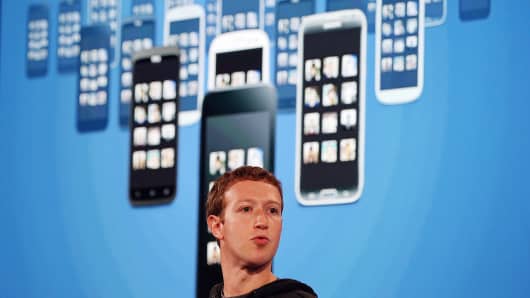Facebook's new Home application for Android devices may put the social giant at further odds with Google.
The new Home application—which runs on Google's Android operating system—basically makes the Facebook platform the center of the user's smartphone, drawing the user into the Facebook ecosystem and diverting the user away from Google's services and its advertisements.
(Read More: As Web Search Goes Mobile, Apps Chip at Google's Lead )
"Basically, the mobile industry for Google changed yesterday," said Trip Chowdhry, a managing director at Global Equities Research. "The announcement showed Google has gotten its mobile strategy completely wrong, what Facebook did yesterday could have happened at any time but it took a smart company to exploit this."
Facebook is essentially taking full advantage of the fact that Google allows developers and phone makers to modify its Android operating system. Google also doesn't regulate apps in its app store. Apple, on the other hand, must approve all apps before they can be sold on its platform.
(Read More: Facebook Wants to Be the Home Screen of Your Smartphone )
Once installed, the home screen of a smartphone becomes similar to a Facebook News Feed, but in a stream format, where pictures, status updates, links and messages are displayed. The users can swipe through their Facebook content and open items that interest them.
The new software also incorporates a new messaging function called Chat Heads that allows users to open and answer messages without ever having to close out of a running application. This also helps keep the user locked into the Facebook platform because it incorporates not only SMS messages, but Facebook messages as well.
Along with the application, Facebook also revealed Thursday the HTC First, the first handset that has the Home software built-in. The HTC One—which will cost $99.99 and be available on the AT&T network — and the Home app will be available on April 12.
The simple interface of the Facebook phone will keep users locked into its ecosystem, hence keeping advertisers locked in as well, Chowdhry said.
"What Facebook has said is 'I am your entry into your mobile life, I as a Facebook will tell you what apps to launch and not only that I will simplify your life," Chowdhry said.
Facebook is in an excellent position right now because it is the only player in the social phone space right now, Chowdhry said. And because the social giant has a critical mass of one billion users, there will not be another competitor who can touch Facebook in social phones, he said.
Google, on the other hand, has a major problem.
By keeping the Android OS so open, the search company has left itself completely open to an attack on its ad business.
"Google has to go back to drawing board and think from a business sense. As far as mobile is concerned, I think the world changed yesterday," Chowdhry said. "Being the first screen a user sees is what everyone clamors for. What you saw yesterday was totally groundbreaking."
Zuckerberg, though, said at the press event Thursday that he thinks Facebook Home is actually a good thing for Google because it will drive developers to want to create more apps for Android.
"I think this is actually really good for Android. From what I've seen, most developers put most of their time into iOS, even though their are more Androids out there," Zuckerberg said.
But Chowdhry said that Zuckerberg was basically backing Google into a corner when he made those comments about Home being good for Android.
Zuckerberg was warning Google that it better not change the rules of the game in regards to the licensing of their operating system or else it would hurt their credibility, Chowdhry said.
"Basically, he was sending a message to Google saying 'Hey guys, this is open and you better keep it open.' So this is something that Facebook used to its advantage," Chowdhry said.



